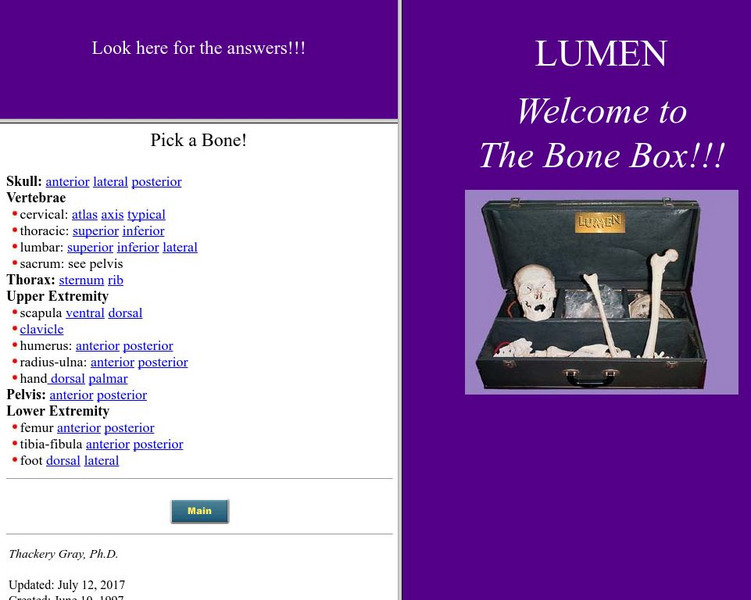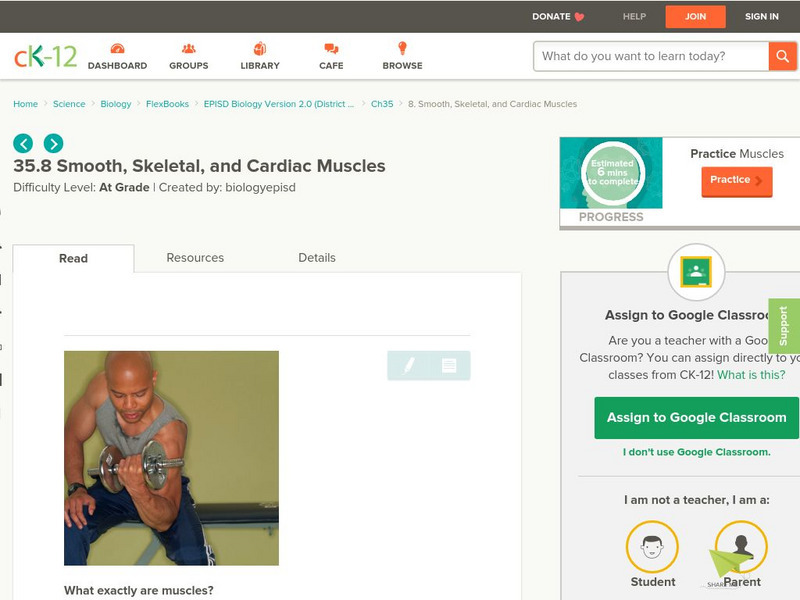Hi, what do you want to do?
Curated OER
Building Bodies
Students identify key anatomical similarities and differences between great apes and humans. They infer likely anatomical features in ancient human ancestors and list principal anatomical changes in primates necessary for adaptation to...
Curated OER
Bones: The Body's Support
In this bones worksheet, students compare the axial and the appendicular skeletons. Students also review the bone components. This worksheet has 6 matching, 8 short answer, 4 fill in the blank, and 6 true or false questions.
Curated OER
Exploring the Five Senses
Young scholars explore the five senses. In this science lesson, students complete activities online in which they research the five senses.
Curated OER
Bird Skeleton
In this biology learning exercise, students identify and label the various parts of a bird skeleton. There are 34 specific parts to label on the sheet.
Curated OER
Human Traces
Students create and construct human skeletons by rubbing casts of bone impressions on paper, and then label most important components of human skeleton.
Curated OER
Movement, it's FUN-damental!
Students discover how muscles work. In this biology activity, students explain the causes of fatigue and muscle soreness. They create graphs and compare results with their classmate.
Curated OER
Kirk Medical School
Fifth graders conduct research on the major organ systems of the human body. They create and present 3D models of a body system, and collect basic first-aid supplies for donation to a third-world community.
Curated OER
Owl Pellets
Learners dissect owl pellets, and compare, identify and record rodent skeletal parts. They compare rodent skeletal diagrams to human skeletal diagrams.
Curated OER
Our Systematic Body
Students explore several parts of the body system in the eight lessons of this unit. Through several hands-on activities, the skeletal, muscular, digestive, circulatory and nervous systems are observed.
Curated OER
All About Me
Learners examine who they are through the arts and sciences. They create a portfolio entitled, " All About Me."
Curated OER
Bats
Students model how the bones in a bat wing are organized. They develop questions about bat body parts based on photographs. They hypothesize how bats locate their food.
Curated OER
Anatomy
Fifth graders identify and describe the functions of the major body systems. They discover how to maintain a healthy lifestyle with proper nutrition and exercise. They answer comprehension questions to end the lesson.
Curated OER
Adaptations
Eighth graders choose an animal and research its various adaptations using
their information, 8th graders create an informational tri-fold brochure or newsletter. They should include facts about the animal's adaptations as well as...
Curated OER
Dissecting Owl Pellets
Students examine owl pellets and what their diet consisted of, specifically rodents. This furthers their understanding of simple food chains as well as bone structure and identification.
Curated OER
What Animal Am I?
Students brainstorm different characteristics of invertebrates and investigate invertebrates by conducting Internet research.
Curated OER
Alcohol and Pregnancy Don't Mix!
Seventh graders learn about John Kellerman, a youngster who was born with Fetal Alcohol Syndrome. They learn how alcohol and pregnancy doesn't mix.
Curated OER
Can You Dig It?
Young scholars investigate a fossil site and diagram a site map. They role play as paleontologists.
Open Curriculum
Open Curriculum: The Skeletal System
After studying this article, students will be able to identify the functions and structure of bones, types of bones, bone development, parts of bones, types of joints, and bone disorders.
Alabama Learning Exchange
Alex: The Skeletal System
This lesson is designed to teach children about the skeletal system. Children will learn about the different bones that make up the body and be able to identify those bones. Young scholars will have the opportunity to navigate the...
Other
Get Body Smart: Human Anatomy and Physiology: Human Body Systems
This source offers a great overview of the various systems of the human body. Each part is identified and described on this site by a veteran science professor. Many interactive quizzes are located here as well for students looking to...
E-learning for Kids
E Learning for Kids: Caribbean Sea: Antilles: How Does a Skeleton Work?
James identifies bones of the skeletal system and teaches us how they work with our muscular system for our body to function. Learn about the skeletal system, bone identification and muscle function. For every correct answer you can gain...
Math Science Nucleus
Math:science Nucleus:identifying Bones of the Body (Lab)
A nice site which provides descriptions of each of the bones that make up our skeletal system. Then there is a lab activity for students to complete in which they build a skeletal system and describe the structure/function of each bone...
Loyola University Chicago
Loyola University Medical Education Network: Welcome to the Bone Box
An interactive site that provides a picture of a skeleton segment. On the picture is a number with a line pointing to a part of the skeleton. When you click on the number the part is identified.
CK-12 Foundation
Ck 12: Episd: Smooth, Skeletal, and Cardiac Muscles
[Free Registration/Login may be required to access all resource tools.] Identify and describe the primary types of human muscle tissue.




























